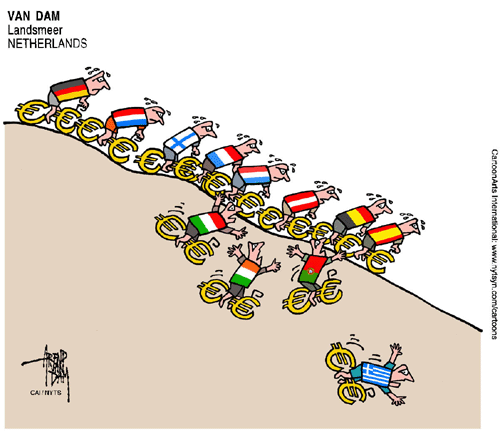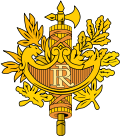 The robust economy of Germany is starting to feel the effects of the economic crisis of its partner nations in the Eurozone and is showing signs of drastic slowing
The robust economy of Germany is starting to feel the effects of the economic crisis of its partner nations in the Eurozone and is showing signs of drastic slowing
Growth in the German economy slowed sharply between April and June and was weaker at the start of the year than previously thought, figures show.
The (German) economy grew by just 0.1% in the quarter, according to figures from the national statistics office. Growth in the eurozone as a whole also slowed.
Germany had been driving the economic recovery in the eurozone.
The figures come as German Chancellor Angela Merkel and French President Nicolas Sarkozy begin crunch talks.
The two leaders are discussing ways to solve the eurozone debt crisis that has threatened to engulf Italy and Spain and has sparked turmoil on global stock markets.
Figures also released on Tuesday showed that eurozone economic growth slowed to 0.2% in the second quarter, down from 0.8% in the previous three months.
The slow down has had its effect on markets in Europe and early trading in the US:
The news led European indexes lower. Germany’s DAX fell 2.6 percent, the FTSE in Britain was 1.3 percent lower, and in France the CAC 40 was down 1.9 percent.
In early trading, the Dow Jones industrial average was down 80.68 points, or 0.70 percent, at 11,402.22. The Standard & Poor’s 500-stock index was down 11.02 points, or 0.91 percent, at 1,193.47, and the Nasdaq composite index was down 26.38 points, or 1.03 percent, at 2,528.82.
“German G.D.P. data is the catalyst this morning that got us off to a bad start,” said Paul Mendelsohn, chief investment strategist at Windham Financial Services in Charlotte, Vt.
The German chancellor, Angela Merkel, and President Nicolas Sarkozy of France were to meet later Tuesday to discuss measures to contain Europe’s fiscal crisis. A joint news conference was scheduled at noon E.D.T.
Another component of the down turn is the idea of issuing bonds backed by all Eurozone nations to ease the crisis has been poo-pooed by both German Chancellor Angela Merkel and French President Nicholas Sarkozy but they may have no other choice:
The euro bond concept is gaining traction among economists and other outside experts like George Soros, the billionaire investor, as a way of preventing borrowing costs for Italy and Spain from rising so much that the countries become insolvent, an event that could destroy the common currency.
Debt issued and backed by all 17 members of the euro zone, euro bond proponents say, would be regarded as ultrasafe by investors and could rival the market for United States Treasury securities. The weaker euro members would benefit from the good standing of countries like Germany or Finland and pay lower interest rates to borrow than if left to face investors on their own.
“It may well be in order to calm markets right now,” said Jakob von Weizsäcker, an economist for the German state of Thuringia who has proposed a way to structure euro bonds so that countries would be encouraged to reduce their debt.
On the “bright side”, there is Nouriel Roubini:
.Karl Marx was right that globalization, financial intermediation, and income redistribution could lead capitalism to self-destruct
Now a combination of high oil and commodity prices, turmoil in the Middle East, Japan’s earthquake and tsunami, eurozone debt crises, and America’s fiscal problems (and now its rating downgrade) have led to a massive increase in risk aversion. Economically, the United States, the eurozone, the United Kingdom, and Japan are all idling. Even fast-growing emerging markets (China, emerging Asia, and Latin America), and export-oriented economies that rely on these markets (Germany and resource-rich Australia), are experiencing sharp slowdowns.
Until last year, policymakers could always produce a new rabbit from their hat to reflate asset prices and trigger economic recovery. Fiscal stimulus, near-zero interest rates, two rounds of “quantitative easing,” ring-fencing of bad debt, and trillions of dollars in bailouts and liquidity provision for banks and financial institutions-officials tried them all. Now they have run out of rabbits.
Fiscal policy currently is a drag on economic growth in both the eurozone and the United Kingdom. Even in the United States, state and local governments, and now the federal government, are cutting expenditure and reducing transfer payments. Soon enough, they will be raising taxes.

 The robust economy of Germany is starting to feel the effects of the economic crisis of its partner nations in the Eurozone and is
The robust economy of Germany is starting to feel the effects of the economic crisis of its partner nations in the Eurozone and is  The arrest of IMF President Dominique Strauss-Kahn in New York City on sexual assault charges puts on interesting twist on the French Presidential Elections. He is finished as head of the IMF and most certainly washed up with politics in France whether he is acquitted of these charges or not. The French like their sex but not necessarily on the front page of every newspaper around the world. This leaves a gaping hole for the Socialist Party (Parti Socialiste) of whom M. Strauss-Kahn, known as DSK in France, was the leading candidate and was expected to defeat President Nicholas Sarkozy.
The arrest of IMF President Dominique Strauss-Kahn in New York City on sexual assault charges puts on interesting twist on the French Presidential Elections. He is finished as head of the IMF and most certainly washed up with politics in France whether he is acquitted of these charges or not. The French like their sex but not necessarily on the front page of every newspaper around the world. This leaves a gaping hole for the Socialist Party (Parti Socialiste) of whom M. Strauss-Kahn, known as DSK in France, was the leading candidate and was expected to defeat President Nicholas Sarkozy. 
Recent Comments